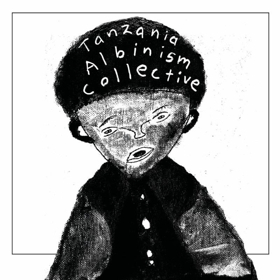Third Man Records Releases Tanzania Albinism Collective's Debut 7' Single

Today, Third Man Records is proud to release the Tanzania Albinism Collective's debut 7" single,"White African Power (We Live In Danger)" b/w "Stigma, Everywhere." The Tanzania Albinism Collective is comprised of former non-musicians who have never previously been allowed the freedom to sing due to their home culture's prejudice against those living with albinism. Proceeds from the release will benefit StandingVoice.org, which exists to end human rights abuses against marginalized groups. Purchase the 7"-only single HERE.
Ukerewe is the largest inland island in Africa and can only be reached by an overpacked four-hour ferry ride. It is a place so remote that historically people often traveled there to abandon their albino children.
Eighteen members of the Standing Voice community volunteered for the songwriting workshop that led to these recordings, ranging in age from 24 to 57. They encouraged them to write about their experiences with persecution due to their condition and to express what they wanted others to understand about their existence. But even among the willing, singing-out proved hard amongst a group that routinely avoided eye contact, rarely spoke above a whisper, and were unaccustomed to dancing.
Upon arriving, they learned that the local community with albinism had not only never been asked to sing, but often were forbidden to, even in church. As appalling as that is, it should maybe not come as such a surprise in light of how even among those parents that actually do choose to keep their child, some families still often force that child to eat outside and apart from their other siblings.
Produced by Grammy-winner Ian Brennan (Tinariwen, Zomba Prison Project, Malawi Mouse Boys, Ramblin' Jack Elliott), the Tanzania Albinism Collective actively pushes the boundaries of what is considered African and "world music," while continuing to confront the dangers that the collective face daily due to prejudice and persecution at home.
Side A features largely "found instruments" - a frying pan, sledgehammer, beer bottle and rusty nail, straw broom, and possibly the largest kick-drum ever utilized - a cracked rain-barrel that stood taller than me and could only be encircled by six people joining hands. On the tune "White African Power" the collective assert their right to freedom in the face of persecution, abuse, social exclusion, rape, and even murder.
While spending time with the collective, it came to light that it had always been one of the collective's standout singers, Hamidu's secret dream to sing. Since he was so often abandoned at home when his mother and siblings ventured out, unbeknownst to anyone else he would sing to himself to curb the loneliness - a classic case of music being medicinal.
The desire to be heard burned in him so keenly that he even once saved up his meager income in order to approach the one and only recording studio on Ukerewe Island. But despite much effort and sacrifice on Hamidu's part, the studio owner instead turned him away. Angrily refusing Hamidu's hard-earned shilling, the engineer shouted in Hamidu's face that he was just "trash," that no one would ever want to listen to him, and warned him to never return. The studio owner insisted that no matter what, they would never work with Hamidu.
One would be hard pressed to find a track as visceral and disturbing as Side B's "Stigma, Everywhere." It highlights the sound of Hamidu venting his rage for the first time. This was the individual from the community that his peers were most shocked had shown interest in performing at all due to his extreme shyness. In fact, when Hamidu opened his mouth to sing for the first time, a wave of disbelief, laughter, and awe at the power of Hamidu's voice was registered by one of his dearest and longtime friends.
During this tune, Hamidu is yelling stream-of-consciousness protests, mostly the line, "Leave me alone!" And at :59 seconds in, it grows so disturbing and harrowing that it could probably make N.W.A. blush in their heyday. This onslaught had come so spontaneously that Brennan simply had to grab the nearest mic at hand that was already plugged-in and toss it his way, as it was clearly never to be repeated with the same intensity.
Thankfully, due to the success of their debut album, White African Power, the members acquired passports and left their homeland for the first time ever to perform at Peter Gabriel's WOMAD Festival in the UK. "We had to travel outside of our country to be heard at home," says Riziki Julius, the collective member who, in addition to his musical contributions, created the cover artwork for their vinyl single.
Comments
Videos

